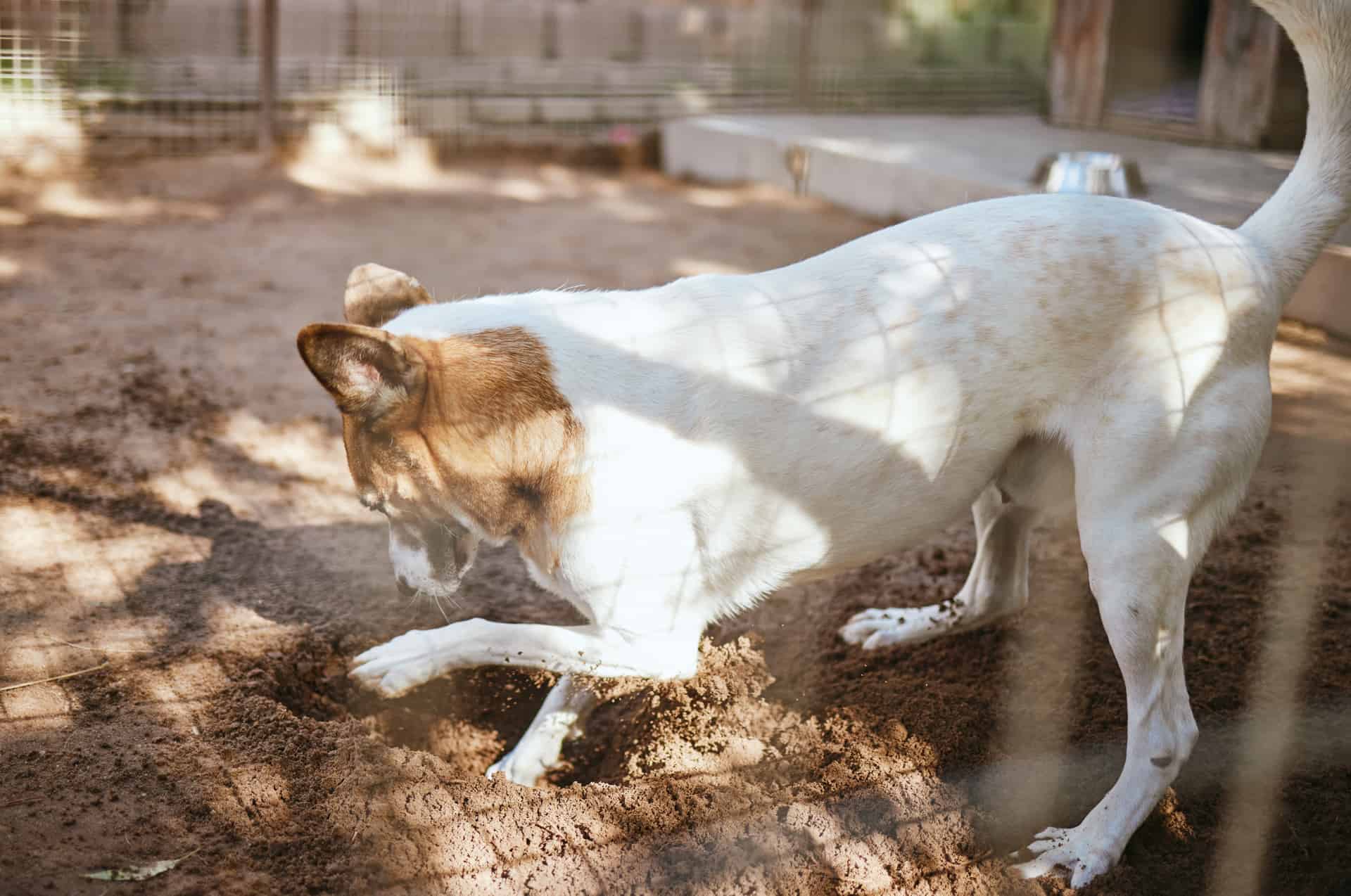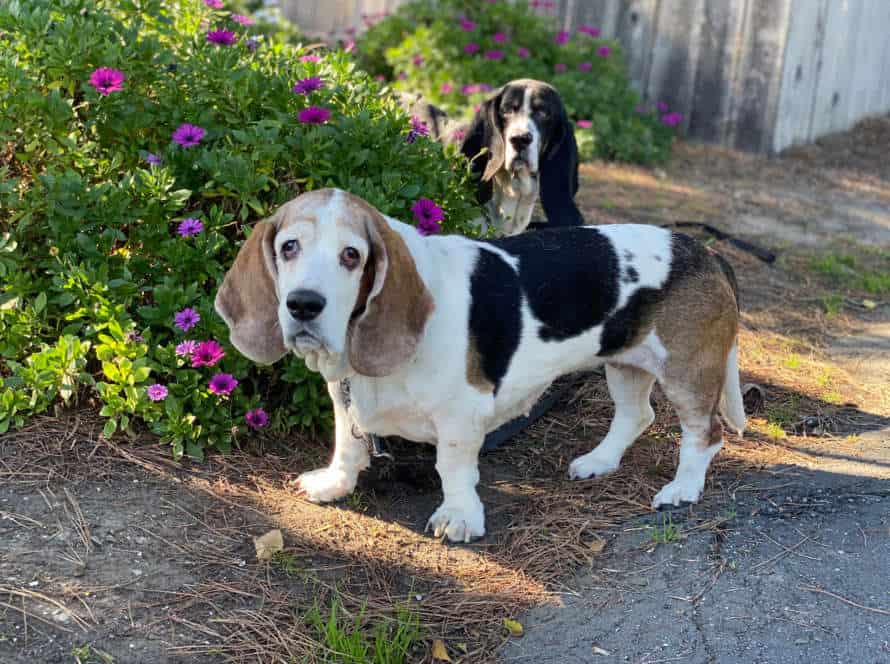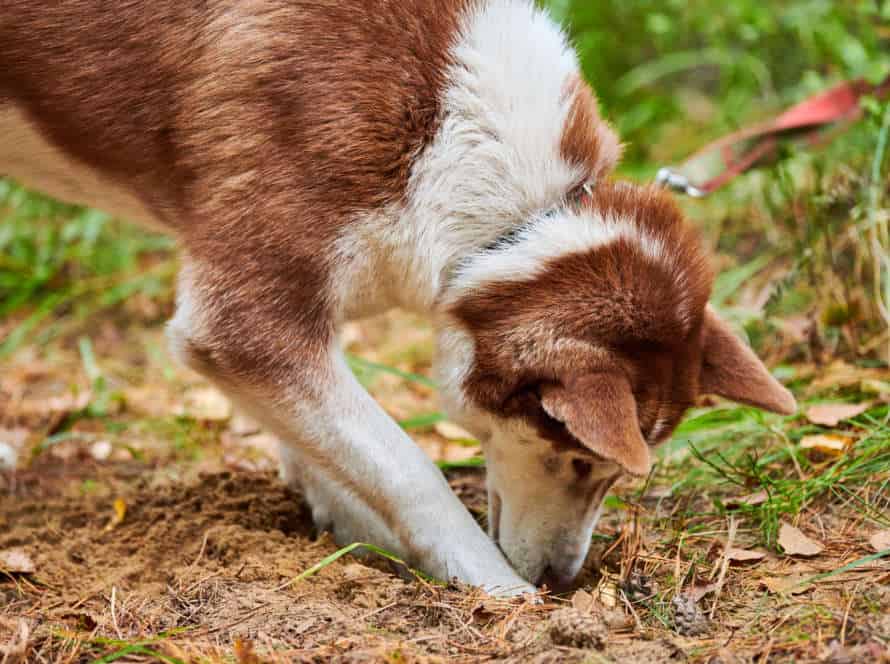Addressing the Root Causes of Your Dog’s Digging Behavior
Sadly, there’s no single solution to stop your pup from digging. To tackle the issue, you need to pinpoint the cause. Reasons may include:
- Boredom – Dogs may dig when they don’t get enough movement or mental stimulation.
- Territory Marking – Digging helps dogs make their place in the pack.
- Hunting Instinct – Certain breeds have a natural urge to search for prey by digging.
- Underlying Medical Issues – Allergies, arthritis, or thyroid problems can lead to digging.
Once you know why your pup is digging, you can try positive reinforcement training, give more exercise and mental stimulation, or speak to a professional dog trainer for advice.
Pro Tip: Have your dog examined by a vet to make sure there’s no underlying medical reason for the digging.
Understanding why dogs dig
Digging is a common, yet troublesome, doggy behavior. To handle the issue, it’s vital to know why your pooch is digging. Working out the reason can help stop the digging in the future. Here are some likely explanations for your pup’s digging:
Instinctual behavior in dogs
Dogs are instinctual animals and have a range of behaviors that come naturally. Digging is one of them. To understand its roots, here are some possible causes:
- Boredom – if left alone or with little interaction, dogs may dig to release energy.
- Anxiety and stress – to relieve their feelings, dogs may dig for security.
- Temperature – digging can help keep them cool in hot weather and warm in cold weather.
- Prey instinct – they may dig to find rodents and insects.
To solve the issue, give your dog exercise, mental stimulation and attention. Supervise them outside, provide a digging area and the right shelter and living environment.
Digging due to boredom and excess energy
Dogs love to dig – it’s healthy for them. But if it’s too much, it can be a problem. Here’s how to stop it:
- Give your pup lots of exercise and brain games.
- Make a dig spot with soft dirt and toys your dog can find.
- Supervise when out and guide to the dig spot if they start somewhere they shouldn’t.
- Reward when they use the right spot.
- Crate train or confine when you can’t watch them. Pro tip: Lots of exercise and fun activities keep them content and less likely to dig due to boredom.
Digging as a means of cool down
Dogs dig for many reasons, such as to chill, hide treasures, or just for fun.
If your pup digs for cooling off, give them cooler spots like a crate, a shady area, or a cool room.
You can also put a shallow pool with cold water where they usually dig. This will keep them cool and away from digging.
If that doesn’t work, adjust the exercise time to cooler hours.
Also, make sure they always have access to clean water. This will help regulate their body temperature and lessen their need to dig.
Identifying the root cause of your dog’s digging behaviour
Dogs dig. Reasons vary – from boredom to anxiety to hunger. Why does your pup dig? It’s important to figure out. In this article, we’ll look at potential causes and tips to help stop digging.
Analyzing the environment your dog lives in
Analyzing your pup’s habitat can aid in finding the source of their digging behavior.
Dogs can dig because of boredom, anxiety, or instinct. It’s key to understand the cause to manage the behavior well. Here’s what to think about:
- Exercise shortage: Dogs with lots of energy are probably more inclined to dig.
- Boredom: Left alone for long times without stimulation? Digging may be their way of expressing frustration.
- Heat/cold: Dogs can dig to control their body temperature in both hot and cold weather.
- Instinct: Certain doggo types, like terriers, naturally dig.
Taking a look at your pooch’s environment can help you recognize the source of the digging and take useful steps – like more exercise, mental stimulation, or a designated digging area.
Pro Tip: Positive reinforcement, redirecting the digging, and making sure they get enough exercise and stimulation can help prevent digging.
Studying your dog’s behavior while digging
Analyzing your pup’s antics when they dig can assist you in determining the source of the behavior. With that in mind, here are a few tips to help you understand what is causing your pup’s digging:
- Notice when your pup is likely to dig – when they are bored, anxious, or attempting to escape?
- Watch where your pup is digging – just one place or the whole yard?
- See what is around your pup when they are digging – are they near a fence, garden, or newly-planted area?
Once you have established the source of your pup’s digging, you can then take action. For example, if your pup is digging due to boredom, you can provide more exercise and stimulation. On the other hand, if your pup is trying to escape, you may need to strengthen your yard’s boundaries or create a designated digging spot in your yard.
Pro Tip: Patience, consistency, and positive reinforcement are essential in addressing any negative pup behaviors.
Consulting with a vet or certified positive reinforcement trainer
Having trouble with your pup’s digging? It’s essential you get advice from a vet or certified positive reinforcement trainer. That way, you can figure out why they’re doing it and find solutions. Here’s why they might dig, and what you can do:
- Boredom or lack of exercise? Give them more playtime and exercise.
- Separation anxiety? Create a daily routine to give them security.
- Seeking attention? Give them attention when they’re calm.
- Seeking prey? Make a special digging area or give them better toys.
- Hot weather? Provide a shaded area with water.
By helping them with a pro and addressing underlying issues, you can improve their behavior and make your home peaceful again.
Providing outlets to redirect digging behavior
Digging is a natural thing for dogs. It can be destructive and a pet-owner’s nightmare! The best way to handle it is to give your dog something else to do. Give them Kongs, puzzles, and other stimulating activities. That way, we can redirect their digging behavior. Let’s take a deeper look!
Ensuring daily physical activity and mental stimulation
It’s essential to give your pup daily physical activity and mental stimulation to stop their digging behavior. Here are some tips to help:
- Designate an area in your yard where they can dig.
- Bury toys, treats, and bones to encourage your pup to dig in the right place.
- Give your dog lots of exercise and playtime to reduce boredom and anxiety.
- Provide your pup with toys and puzzles to keep them mentally engaged.
- Think about signing up for obedience classes to help with their behavior.
- Always supervise your dog when they’re outside to reward good behavior and stop them from digging in places they shouldn’t.
Creating a digging area for your dog
Making a spot for your pup to dig can be a great way to change their digging habits and understand why they do it. Here’s what to do:
- Pick a place in your yard where it’s alright for your pup to dig.
- Put garden edging or a fence around the area so it’s easily recognizable.
- Fill the spot with soil or sand that your pup can easily dig in.
- Hide some of their toys or treats in the soil to get them to dig there.
- When you spot your pup digging in an area they shouldn’t, kindly direct them to the spot you made.
Creating a spot for your pup’s digging gives them an appropriate outlet for their natural impulses and stops them from ruining your yard.
Providing interactive toys and challenges
Interactive toys and challenges can help to divert your pup’s digging behaviour. They can also help combat boredom and reduce anxiety, which are common causes of destructive behaviour such as digging.
Here are some ways to provide interactive toys and challenges:
- Puzzle toys: Offer puzzles to your pup that contain treats or kibble. This will keep their minds active.
- Agility courses: Create a mini-obstacle course with cones, jumps, tunnels etc.
- Hide-and-seek: Hide treats or toys in the yard or home and get your pup to locate them.
These interactive activities can help to address the root of your pup’s digging behaviour and channel their energy in a positive way.
Positive reinforcement training to address digging behavior
Positive reinforcement training: a great way to tackle your pup’s digging. Praise and rewards to reinforce good behavior, and withholding rewards for bad behavior. This type of training helps your dog understand what is acceptable and what is not. Let’s take a look how it can help with the digging!
Teaching the “leave it” or “drop it” command
Train your pup the “leave it” or “drop it” command with positive reinforcement.
Do this by giving them a toy or treat. Once they have it in their mouth, say the command in a firm but kind voice.
Immediately reward them with praise and a treat when they drop it. Repeat this several times a day until they respond to the command.
Then, practice with household objects like shoes or furniture. Positive reinforcement is proven to modify your dog’s behavior without punishment.
Remember: be consistent and patient. Keep training sessions short and frequent for best results.
Implementing clicker training to shape desired behavior
Clicker training is a great way to get your pooch behaving properly. Here’s a guide to get you started:
- Get a clicker and some delicious treats.
- Whenever your pup does something good – like not digging – click the clicker and give them a treat.
- Keep doing this to make it a habit.
- Then, if you see your pup digging, use the clicker to stop them and get them to focus on something else.
- You must be consistent when training your pup. Clicker training can help you address why your pup digs in a positive and successful way.
Applying positive reinforcement to reward good behavior
Positive reinforcement training is a powerful way to stop your dog from digging. This method rewards good behavior to encourage your pup to keep being good. Here’s how to tackle your dog’s digging:
- First, figure out why the dog is digging. Common reasons include: boredom, anxiety, hunting instincts, and comfort-seeking.
- Second, create a space for your dog to dig in. When they choose to dig in that area, give them treats, toys, or playtime.
- Third, follow a routine and stay consistent.
- Finally, don’t punish your pup for bad behavior. It can just make their anxiety worse and create a rift between you two.
Positive reinforcement training is a great way to stop digging and deepen your bond with your furry friend.
Managing your dog’s environment to prevent unwanted digging behavior
Dogs dig – a fact that can be vexing. To manage this behavior, we need to look at the root cause. Managing the pup’s environment and providing outlets for digging-related activities can reduce destruction in the yard. How do we do this? Let’s find out!
Filling holes and blocking off areas
If your pup loves to dig, it can be a daunting task to stop them. Instead of punishing, it’s best to tackle the root cause and manage their environment. Here are some tips to prevent digging:
- Identify why they do it – Boredom? Anxiety? Looking for a cool/warm spot? Figure out the trigger and address it.
- Limit access – Put up barriers like fencing or chicken wire around areas they like to dig.
- Create a designated area – Make a sandbox or an area they can dig in and train them to use it with positive reinforcement and rewards.
- Fill the holes – Fill the holes they created with dirt and cover it with rocks. Then, sprinkle or spray deterrents (vinegar, citrus, pepper) to prevent further digging.
- Remember to show love and care for them too!
Using deterrents to prevent digging in certain areas
Dogs have a tendency to dig, so it’s important for owners to manage their environment. An effective strategy is to use deterrents to stop digging in certain areas. Here are some useful deterrents:
- Place things like pine cones, lava rocks, or chicken wire where your dog usually digs.
- Spray scents like citrus, vinegar, or ammonia in areas you don’t want your dog to go.
- Dig a trench around the area you want to protect and put chicken wire in it, then cover with soil.
- Redirect their digging by giving them a dedicated area with loose soil and sand.
Using these deterrents can help your dog learn not to dig in certain areas, preventing unwanted behavior.
Increasing supervision and monitoring of your dog’s behavior.
Supervise and monitor your pup’s behaviour to block off unwanted digging. To succeed long-term, address the root causes.
Designate one area for digging, like a sandbox or pit.
Stop them from digging other places with fencing, big rocks or raised beds.
Supervise outside and redirect attention with toys or treats when they dig in a no-go area.
Provide exercise and mental stimulation to reduce the urge to dig.
To tackle anxiety or lack of training, enlist help from a pro.
Frequently Asked Questions
Q: Why is my dog digging holes in the yard?
A: There could be several reasons for this behavior, including boredom, stress, lack of exercise, or a natural instinct to dig.
Q: How can I stop my dog from digging in the yard?
A: The best way to stop this behavior is to address the root cause. You can provide more exercise and mental stimulation, train your dog to use a designated digging area, or work with a professional trainer to modify the behavior.
Q: Is it normal for dogs to dig in the yard?
A: Yes, it is natural for dogs to dig, but excessive digging can be a sign of underlying issues that need to be addressed.
Q: Can I punish my dog for digging?
A: Punishing your dog for digging can be ineffective and may even worsen the behavior. It’s important to address the root cause of the digging and provide positive reinforcement for desired behavior.
Q: Should I get a sandbox for my dog to dig in?
A: Providing a designated digging area, such as a sandbox, can be an effective way to redirect the digging behavior. However, it’s important to train your dog to use the designated area and provide adequate supervision.







